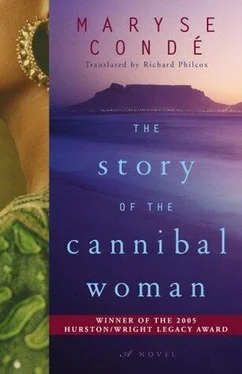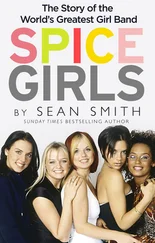“What do you expect him to do? Spend his life lamenting the dead? In the end, it’s always life that wins.”
After a quick look at the university housing, Stephen had dragged her on a house hunt. They both fell for the house on Faure Street. Of course, all those who knew Cape Town advised them not to live in the center of town. Much too dangerous! Worse than the Bronx! Worse than Harlem! But Harlem is no longer Harlem ever since Rudy Giuliani launched his trigger-happy police. To prove it, Magic Johnson has invested there. The center of town is worse than anything you’ve ever known. But Stephen was taken with so much space: ten rooms, a balcony, and a garage. Rosélie had fallen in love with the tree. With arms outstretched, it shouted to be let free in its little patch of lawn, and she got the impression the years had rolled back. A traveler’s tree! A silent witness to her games at Papa Doudou’s. She would huddle in its heart and the swarm of cousins would grouse they couldn’t find her.
“Where on earth is she?”
The triangular trade had been reversed. Before arriving in Cape Town, the Christ-Roi had anchored at La Pointe, where it had replaced its ebony cargo with other species. The magic of the long-lost tree, of Nature, the smell of the mighty ocean parading as far as the eye could see, and the everlasting distress of her people like a canker in the midst of so much beauty cast a powerful, equivocal spell, a magical, perverse philter against which she was helpless. A frenzy of blood flooded through her heart, her head, her arms and legs, and she painted, painted for days on end, endeavoring to convey her conflicting feelings with her brushes. Rage. Repulsion. Seduction. Love. Hate. Stephen, who had been mortified by her lack of enthusiasm for New York, capital of the world in his eyes, was elated.
“You say you can’t bear this city, this country. And yet it inspires you. You’ve never painted anything so original.”
Without a moment’s hesitation he bought the house, muttering that the estate agent was letting it go for a mere song. Something quite unlikely, since the center of Cape Town had recently been classified an historical area. But Rosélie didn’t protest.
For three whole days a Congolese (there are forty thousand in the country) turned over the soil in the garden.
He planted canna lilies, gladioli, gerberas, and especially white flowered flag bushes, a fragile shrub with a liking for humidity.
Stephen was born in Hythe, a small coastal town in Kent. Cecil, his father, had been an engineer in charge of maintaining the military canal, a remnant of the Napoleonic wars. An unrewarding job he carried out dejectedly, dreaming of an Elsewhere, when he was offered a managerial position in Bangkok. Annie, however, his French wife and a former governess, was five months pregnant. Reluctant to leave her alone in her condition, he had given up the offer. Ever since, he had made the mother and child pay for his sacrifice.
“I never knew him to be anything else but irascible, furious with a rage that I understood much later when I began to feel it myself.”
Stephen had grown up in a small, one-story brick house, three windows on the first floor, two on the second, so identical to the houses on either side along St. Nicholas Road that he had to check the two numbers over the front door before entering. After school, he was regularly beaten up in the public gardens by the little bullies who called him a sissy because of his pretty face. On Sundays his parents would have lunch in a pub, always the same one. While he sipped his lemonade they would glower at each other over their lager. The view from the pub looked out onto the gardens of the nearby castle where blond-haired little aristocrats pedaled hard on their bicycles. Finally Annie had the courage to divorce and took Stephen back to Verberie, her hometown, where the buildings and humans share the same grayness. A few years later she married again, this time a school principal, a childhood friend, like Cecil but gloomier. She had two boys.
In order to escape this horde of relatives — the mother, the mother’s sisters, the stepfather, and the half brothers — Stephen got it into his head to return to university in England. Alas! Oxford and Cambridge thought his diction much too French! He’d lost his tonic accent, the rise in intonation and, especially, that distinguished stutter. So he had to make do with Reading. There, he had above all made his mark playing Chekhov with the university theater group. Since nobody claimed him — his father and mother having virtually forgotten him — Stephen began to travel the world. At the age of seventeen, he had almost got killed traveling through Italy and Greece on a scooter. At eighteen he lost his virginity in a bar in Houston where he had been raped by the owner and his wife in turn. At twenty, he dreamed of imitating Malraux. During a stay in Bangkok he had been content to photograph the bas-reliefs of the temples instead of looting them. At present, he proclaimed himself without a country and avoided Europe. Not entirely. He would spend a few days in the summer in Hythe, where he rented a car and drove along the coast, passing through the string of seaside resorts of Margate, Ramsgate, Sandgate, Greatstone, and Littlestone. Then a week in London.
Throughout his stay Stephen constantly called on Rosélie to bear witness.
“You can understand why I loathe this country.”
She looked around her and failed to understand. She was rather charmed by the color of the sea, so different from the Caribbean you wondered whether it was made from the same substance, the white facades of the great hotels, somewhat worse for wear, the ill-dressed crowds munching fish and chips on the endless piers, the boutiques stuffed with cute, unnecessary objects, and the tea shops that closed at five o’clock, just when it was teatime. And then she adored London. She would wander aimlessly counting the mixed couples whom she alone noticed. She envied them; they looked so happy and carefree. How did they manage?
Stephen always lodged with his friend Andrew Spire. They had shared a room at Reading. During their university vacations they had discovered Europe together. Then they had gone through hard times in London, both of them dreaming of becoming an actor. Andrew was single, as finicky as an old bachelor, handsome and marmoreal like Michel-angelo’s David . Despite his frigid expression, he published unsavory, erotic poems dedicated to T in an avant-garde journal. Rosélie was convinced T was a man.
I would love to be the cigarette
that your desire slowly consumes
penis of fire that becomes smoke
in your mouth.
After years of walk-on parts with obscure theater companies, he had managed to get a teaching job at the Royal Academy of Dramatic Art, thanks to his connections in high-up places. The house he had inherited from his grandmother, widow of a senior civil servant in India, was furnished with marquetry-worked sideboards, canopied beds, rocking chairs, and copper-studded chests shipped back from Udaipur. Andrew had added half a dozen Siamese cats, meowing haughtily, who clawed and ran over the sofas as if they were perpetually in heat. After these weeks in London and Hythe, Stephen would cross the Channel and go to visit his mother alone, now widowed, and dumped in an institution for seniors by the sons from her second marriage, executives in a large private bank who were snowed under with work.
Rosélie preferred to drift idly through the streets of Paris. She was a regular guest of a hotel in the Marais because Cousin Altagras lived close by. Out of all the Thibaudins, and there were enough of them to populate an entire district of Guadeloupe, all very prim and proper, Rosélie was the only member to frequent Cousin Altagras, daughter of one of Elie’s half brothers, who had arrived in France after the Second World War supposedly to study art. It was not because she had married a white man. The Thibaudins were above such considerations. It was because Lucien Roubichou, that was the name of the husband, owed his fortune, his apartment on the Place des Vosges, and his Audi Quattro to a rather special kind of industry. In short, he was a porn merchant, responsible for a certain number of immortal masterpieces, well known in closed circles: Lucy, Suck My Sushi; Don’t Speak with Your Mouth Full ; and Caress Me, Caress Me , no connection with the famous song from Martinique. The family accused him of having used Altagras when she was a ravishing beauty and of now doing the same with their two daughters. Incidentally, he was a man of gentle manners, mad about cooking and Italian cinema. His specialty was vegetarian lasagna. His passion: Pier Paolo Pasolini, whose theorems he subtly analyzed. In spite of her diabolical reputation, Cousin Altagras was a disappointment for Rosélie. She had given up any artistic claims in order to cook beef stew for her litter of children. Marriage does that.
Читать дальше












